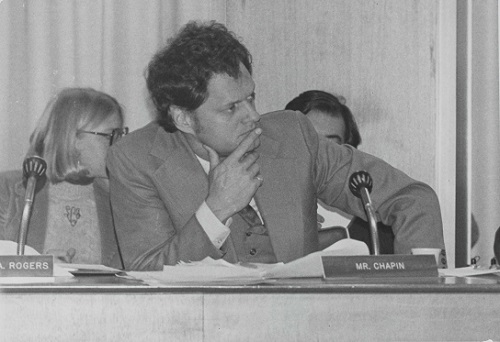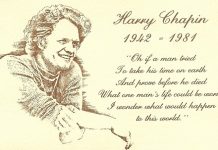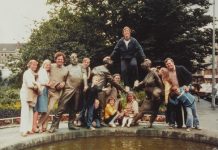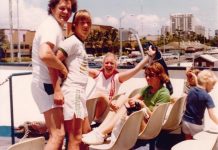By Ira Kantor
Photos Courtesy Chapin Productions LLC
The life of Harry Chapin, charismatic musician and iconic humanitarian, was unexpectedly and tragically taken on July 16, 1981. He was 38 years old.
A human dynamo whose sheer tenacity landed him on the Billboard charts, on Broadway, in the White House, and at the forefront of the world hunger movement, Chapin lived by the mantra of “When in doubt, do something.” In following this mentality, Chapin’s 10-year solo career encompassed more than 2,000 concerts, nine studio albums, the creation of global nonprofit World Hunger Year (now WhyHunger) and the love and respect of fans, fellow musicians and key political influencers alike.
Hailed as a consummate musical storyteller, Chapin is best known for his character-driven tunes —“Taxi,” “Sniper,” “W-O-L-D,” “A Better Place to Be,” “30,000 Pounds of Bananas” and “Cat’s in the Cradle” included. Yet despite having only four Top 40 hits to his name, Chapin’s songs remain one of a kind — elevating him to the same artistic status as classic singer-songwriters of the era like James Taylor, Jim Croce, Gordon Lightfoot and John Denver.
Nearly 40 years after his death, the following 10-part oral history seeks to tell Harry Chapin’s story through the firsthand, on-the-record testimonies of the “characters” who knew him best – more than 50 family members, friends, business and political associates and musical contemporaries. For added context, Harry’s own voice, along with other relevant news articles and reviews during his lifetime, are included in italics.
While there are other individuals and events crucial to Harry’s tale who were unable to be interviewed or showcased for this series, this still seeks to provide a well-rounded retrospective of a man whose life, being, sense of accomplishment and legacy remain unsurpassed to this day.
***
Chapter VII
GAPIN’ CHAPIN
Bill Ayres (Friend, WhyHunger co-founder): Harry kind of always called himself “Gapin’ Chapin” because he wasn’t afraid to sort of make a fool of himself. We’d go into a meeting and often we’d play good cop, bad cop. He would get up and yell at people and say, ‘Hey we got to do this, we got to do that.’ I’d say, ‘Well maybe we ought to just think about this.’ So this one day we’re walking into this meeting with the Councilor of Churches and there’s all these religious leaders. I said to him, ‘You got to be on your good behavior.’ ‘Don’t worry about it.’ I’d always sit next to him so I could kick him if he sort of went off. We walk in and he goes and sits between two other guys so I can’t sit next to him, and he smiles at me. He had this big smile like, ‘I got ya, you can’t touch me.’ He knew what he was doing exactly. We both laughed at each other.
Jen Chapin (Daughter): I was vocal — ‘Daddy, why do you have to work on your birthday? Why do you have to work on my birthday? Why do you have to work on this holiday?’ I think my mother said that it was me and Jono. Everybody else were sort of puppy dogs. Like they would take what they would get but we would give him a hard time. I did it in a little girl way and Jono did it in a teenager way.
Byron Dorgan (Friend, Former politician): He was unpretentious. I remember the day I met him at Rutgers University he was driving a little white Volkswagen. He said, ‘I’ll give you a ride,’ and I’m thinking, ‘He’s going to have a pretty big vehicle.’ He’s driving a little white Volkswagen.
***
Harry Chapin (From a 1980 concert program): A year-long effort that began in 1977, by WHY, the Food Policy Center (our Washington-based lobbying organization), and myself, has resulted in the formation of a presidential Commission on World Hunger. I have been appointed by President Carter to the Commission whose mandate is: why, after 20 years of programs and expenditures of billions of dollars, has there been no significant progress in dealing with the hunger problem?
Bill Ayres: He would either charm (congressmen) or he’d bowl them over. In other words, he’d walk into a congressman’s office — and I was with him on a lot of these – and say, ‘You and I both know hunger is wrong, it’s immoral, it’s crazy. We don’t have to have it we need to have a policy to fight hunger around the world and here in the United States. Would you sign onto this Presidential Hunger Commission?’ Most of them did. Most of them did. A lot of them did because they liked him and they believed in the cause. Some of them, I think, did it because they just wanted to get rid of him.
We’d walk the halls of Congress, and I’m a very fast walker, and he would leave me in the dust, man. He was fast. I have long legs and he had longer legs and we’d go around. I’d say, ‘Hey slow down.’ But when he’d get in the office he didn’t slow down either, you know what I mean. He’d just go right at them. And he had some allies. I mean he got a number of people. On the Senate side we had Pat Leahy in Democrats and Bob Dole signed on. Then on the House side we had got Rick Nolan, I think he was from Minnesota, and Ben Gillman, a Republican from New York. They were sort of our key people in the House and Senate.
Thomas Downey (Friend, Former Politician): Harry had an inside flair in the Congress — he had me. We did this together. I mean I don’t want to overstate my role here. It was much more advisory than anything else, but I introduced him to other members of Congress who were friends who both liked his music and agreed with his positions. I took him down to the House gym once, which was really a terrible breach of protocol on my part. He was, along with his brother, a very good basketball player, and I remember he was excited to be in the House gym which was kind of an inner sanctum until he saw some member of Congress that he wanted to talk to. He was about to accost this person as they were getting dressed. I said, ‘No, we don’t talk to anybody at the gym.’
What we would do is we would basically set the meetings up and he would go to them, and sometimes I would accompany him and sometimes I wouldn’t. He didn’t need me to make kind of a forceful argument to my colleagues. It was not just his ability to basically sell the message, which was very important, but his ability to enthuse those who were going to be kind of the legislative warriors. That was also one of his constant skills.
Robert Mrazek (Friend, Former Politician): Boy, he won over a lot of Republican members of Congress and senators. He would just come into a room and he projected this kind of aura. You could feel the goodness in him. Even cynical Washington politicians could feel that power and be moved by it.
***
Walter Falcon (Presidential Commission on World Hunger Member): Harry cared deeply about food and agriculture and hunger. He and I saw the world somewhat differently as to what was needed to fix the world and so we were sometimes on the same side of the fence, sometimes on opposite sides of the fence. But our conversations were cordial and lively.
Big John Wallace (Bassist): Ever since ’75 on, he was spending a lot of time in Washington, making a lot of friends and having a fair amount of influence.
He was proud of this. There was one 17-day stretch when he was doing his heavy lobbying for a commission on hunger and he said, ‘In 17 days, I haven’t laid down in a bed.’ He would get the last flight out after the gig; he’d sleep on the plane; he’d spend all day in Washington; he’d sleep in the cabs; sleep on the plane back to the gig; do the gig; 17 days in a row. He was very, very physically fit and a dynamo. They are all big, strong, healthy guys with tremendous energy. If you were talking to Harry and walking with him, he’d be walking fast and you’d be running alongside, you know.
Bill Ayres: Harry called me up and said that, ‘Hey, we’re going to the White House. We’re going to meet with the president’s son and hopefully the president and what we want to do is to do a concert,’ because we had tried to do this Bangladesh type concert for the Saleine region of Africa, and the president got this idea of doing this concert for Africa. So he called us and Harry said, ‘You got to get dressed up.’ I said, ‘What do you mean, me get dressed up. You got to get dressed up. You don’t have a suit.’ He said, ‘Oh yeah I do. Sandy just took me out and got me a suit at this store in Huntington.’
I meet him at the plane over at LaGuardia and we’re standing on line and he bends down to pick something up and KRRRSSHH the whole thing rips. I mean it didn’t just rip; I mean it ripped. The pants were too tight for him obviously and he had a big hole down the back of his pants and he showed me that. I said, ‘It’s a good thing you got underpants on.’ So we get on the plane and I said, ‘We got to get this fixed.’ He said, ‘Yeah,’ but then the plane got delayed. We wanted to make the meeting. So he had a newspaper and he held the newspaper right behind his rear end with his left hand and he went around and he shook hands with people, holding the paper next to his rear end. After doing this for a while, he said — as only Harry could — ‘Well this is ridiculous, I’ve been peddling my rear end for hunger all over the country, but this is silly,’ and he turns around and he shows everybody and the guys all laugh. It was a room full of record company executives and government officials and they all thought that was wonderful. He hadn’t met [Jimmy] Carter yet. We met a couple of his sons that day.
At first, he decided he would cover it up because I said to him, ‘I hope you’re wearing underpants.’ He said, ‘Yeah, I’m wearing underpants, don’t worry.’ But it was hysterical. I told that story at his funeral, actually.
Don Ruthig (Personal Assistant): Thank God we didn’t have cell phones then; the man would never have rested. He would have had the world’s highest cell phone bill. But there were times when it was just a good time, a good buffer zone for him. The other thing is that we could leave for LaGuardia Airport with 45 minutes before a flight and he’d make the damn flight even though it was a half hour drive. He didn’t have to worry about parking the car or any of that nonsense. There were times when he drove himself and parked the car under a bridge and the car would get towed because he was in so much of a hurry. He’d just park it wherever and leave it.
Bill Ayres: One great story is that Harry’s down in Washington and he’s riding with Pat Leahy and another senator and they are going to go into the Capitol. They are in a car with somebody driving the car, and the guard stops them and Leahy says, ‘I’m Senator Leahy,’ and the other guy said, ‘I’m Senator so and so.’ He said, ‘Well can I see your passes,’ and they both look and say, ‘Oh gee, we left them.’ The guy said, ‘I’m sorry, I can’t let you in.’ And then he looks back and he said, ‘Oh, are you Harry Chapin?’ And Harry said, ‘Yeah’ — ‘Oh go on in.’ And Harry rubbed it in. He loved that story; told that story all the time.
Ken Kragen (Second Manager): He finally got Carter to sign to create this committee that he had been lobbying for forever and he was very close friends with Patrick Leahy. Harry is at the White House and the president is signing the bill and Harry is still selling him on why he should be doing this and Patrick finally leans over and taps Harry on the shoulder and says, ‘Harry, he’s signing it. You can quit selling him now,’ which we thought was very funny.
Dave Marsh (Friend, Critic): Ralph Nader called [Rolling Stone Editor-in-Chief] Jann Wenner and said, ‘You should send someone down because Harry Chapin is the most effective outsider I’ve seen on Capitol Hill.’ By that time they already created World Hunger Year. That was the first time I reported about him.
Walter Falcon: As I understand it, the [Presidential World Hunger] Commission was supposed to look at the issue of hunger both abroad and at home and to make recommendations as to what the United States, and to a degree the federal government, might do to improve things.
The composition of the Commission was somewhat unusual. In retrospect, it probably wasn’t the strongest group that could have been put together on world hunger issues. There were many different backgrounds represented, lots of different points of view. It was hard for the Commission to reach closure on some of the issues and that’s why when you look at the report, there seems to me to be an awful lot of footnotes, reservations and so on.
You would experience someone who was not shy; who was very energetic; who you could tell felt deeply about the subject. But I didn’t think Harry was wonderfully well-informed or perhaps even well-staffed on some of the bigger issues, which, in fact, turned out to be the important ones now with the benefit of history.
***
Bill Ayres: Was the Presidential Hunger Commission successful? Yes, it was, in the sense that it finished its work and it published all these findings, which if Carter would have been president, he would have put into effect. At least I hope he would have. But most of them did not get put into effect because Reagan won. It was a heartbreaker. But a lot of people got influenced by it and some very interesting pieces of legislation and policy came as a result of it, even though it didn’t take room in the way we hoped it would.
Walter Falcon: The March 1980 report of the Presidential Commission on World Hunger has a title of “Overcoming World Hunger: The Challenge Ahead.” It is 250 pages. It came just at the end of the Carter Administration and I don’t think it had very much impact, frankly, but as a historical piece it’s quite interesting.
As I remember it, we tried desperately to finish the report before Carter left office. Whatever the intention was, Carter has a deep and lasting interest in hunger and agricultural development.
It’s not a bad report, it just sort of fell between the cracks between administrations. Reagan was really on to different things. Carter was lame duck on recommendations.
Ken Kragen: One of the true stories that happened with him was that I had taken him to a Laker game on the night of the midterm elections…He had been sitting there at the Laker game — they were actually flashing the results of the election up on the screen. The Republicans were sweeping into power — it was during the Reagan administration. In any event, all I know is Harry turned to me and he said, ‘I’ve got to get to a plane. I’ve got to get back to Washington.’ He actually got up and left in the middle of the game. He said, ‘The Republicans have run on this idea of saving the economy, helping the economy, spending less and stuff and I can show them how curing poverty in this country will reduce crime. They have run on an anti-crime platform and I can show them how if we can reduce poverty,’ he said, ‘I can make this ideal.’ He was watching the people he had supported one-by-one go down in defeat and yet he had turned it immediately into this is a terrific opportunity.
Bill Ayres: One of the defining moments I guess was a negative one, when he and I sat and watched the results of the Reagan victory and we looked at each other, and we said, ‘We just worked our asses off for three years and it looks like it’s all going to go down the drain now.’ After sitting in that vein for like half an hour or so, we both said, ‘OK, what do we do now?’
Jono Chapin (Son): That probably was his greatest frustration was dealing with bureaucracies, red tape, the status quo — ‘No we can’t do this because it’s going to require a little more work from somebody.’ That sort of pushing up against the brick wall and knowing that, boy it’s going to take quite a bit to change this and recognizing that you certainly can’t do it alone, so you need to rally some others and that probably was his greatest gift. I think the music ultimately served him well because it was a conduit to achieve some of those other deep-seeded needs to make a difference.
Howard Fields (Drummer): It was a big lesson to him. I mean I have little doubt that he would have gone into politics. Might have been Senator Chapin by now.
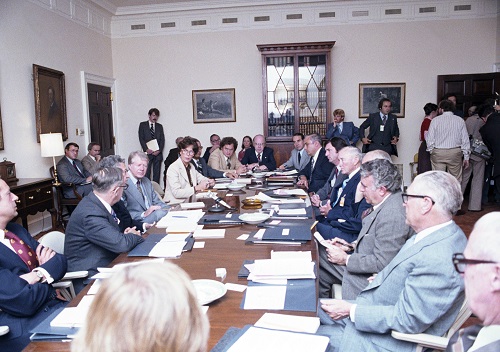
###
###
Share your feedback with Ira at vinylconfessions84@gmail.com.


